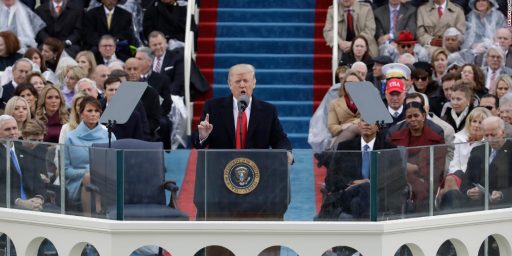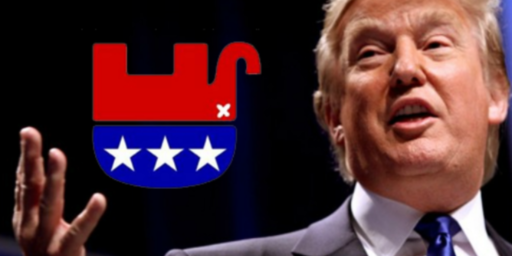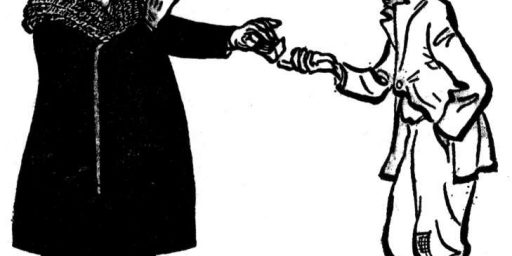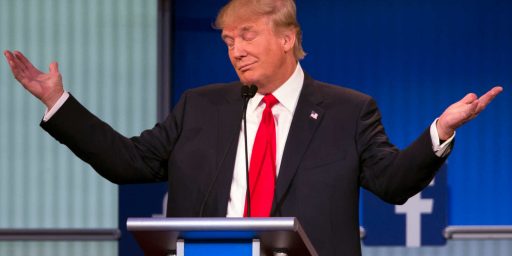Bush-Hating Republicans?
Matthew Yglesias takes on the David Brooks-Andrew Sullivan thesis that “many Republicans hate Bush.”
Andrew refers to this as “life outside the cocoon” but I think it may be the reverse. Certainly, it seems to me that a healthy number of professional conservatives in Washington and New York are kind of sick of Bush and, if nothing else, blame him for damaging the Republican Party and the conservative brand. But the fact remains that Bush’s approval ratings are in the low twenties. If we assume (which I think is safe) that essentially all of that support is coming from Republicans, it means that the overwhelming majority of Republicans (though almost nobody else) thinks Bush is doing a good job as president.
Bush’s approval is actually in the low 30s but, otherwise, that’s probably right. Gallup’s most recent numbers show party ID split 37% independent, 32% Democrat, and 29% Republican. It stands to reason that those 29% proud Republicans comprise most of the 32% of Bush’s positive ratings.
While I haven’t seen the internals on the recent Gallup approval survey, CNN’s Lauren Kornreich reports,
Bush’s approval rating in the latest poll was 36 percent, an increase from 32 percent in June. But CNN Polling Director Keating Holland explained that the improvement is entirely due to Republicans turning around and deciding to stand by their president. “The gain in Bush’s approval is due entirely to Republicans coming home,” Holland said. “There was no change in the approval rating among Democrats or Independents between this poll and the last one, but Bush’s approval rating went up 16 points among Republicans since June.” [emphasis added]
My guess is that the Republicans most disgusted with Bush are those who identify with the party on fiscal and security issues and put up with the social agenda out of necessity. But Brooks, Sullivan, Steve Bainbridge, and other intellectuals comprise such a small percentage of the party as to be a rounding error in the polls.
Further, there hasn’t been a time in my political lifetime (the late 1970s onward) where the commentariat was happy with their party’s president. As popular as Bill Clinton was nationally, the liberal elites hated him. The conservative elites never liked Bush 41. Even Ronald Reagan was too soft for them, however much they pine for him now. And, certainly, Jimmy Carter didn’t have a lot of friends among the Democratic pundit class. Presidents are never sufficiently ideological, uncompromising, tough, or [insert politically ruinous virtue here] for the pundit class.
UPDATE: Matt Stinson found the Presidential Job Approval In Depth figures from Gallup:
Now, that’s a steep dropoff from 82% Republican approval around the time of the 2006 mid-terms, 92% at the time he was re-elected in 2004, let alone the 96-99% the several months after the 9/11 attacks. Still, three quarters approve of his performance, compared to less than a third of the country overall.
For comparison’s sake, let’s look back to his apex:
Democrats and Independents have largely left the president. Relatively few Republicans have.








What about conservatives who hate Bush though? Even though the majority of Republicans may still support Bush, your analysis fails to account for people who have left the party in the last six years.
Well, my apologies to James and my namesake Mr. Yglesias, but I think it’d be better (science!) to look at Bush’s approval by party breakdown. I’d guess that Bush has support from some independents and a plurality of but not all Republicans. Gallup has some relevant data here and, just eyeballing it, Bush seems to have around 80% of Republicans, 25% of independents, and 2-3% of Democrats supporting him. At least one-fifth of Republicans might be disgusted with Bush.
We can also consider tracking whether the rise in registered independents is totally at the GOP’s expense. The Republicans who hate Bush might not be Republicans anymore. Any polls on this shift?
P.S. Should we apply the logic of this post and assume that because Congress is controlled by Democrats and 25% of people approve of Congress, then most Democrats approve of Congress? 😉
fails to account for people who have left the party in the last six years.
Well, that wasn’t the question!
The trends over the last 15 years or so have party ID fluctuating within a pretty thin band. It’s remarkably stable, really. There just hasn’t been an ideological realignment in 30 years or so, when the Southern Democrats slowly started peeling off to the GOP.
There are likely some number of libertarian-conservatives who have gotten disgusted enough with the GOP to quit calling themselves “Republicans” and some subset of that group may even stop showing to vote for Republicans. The aggregate numbers don’t really show much, though.
After a quick search, I haven’t found any polls that broke it down by party ID. It’s probably safe to assume, though, that most who approve of Congress are Democrats.
My recollection of the numbers on Congress, probably from one of Charles Franklin’s analyses, is that neither Democrats nor Republicans have very high approval of Congress at present (as of a couple of months ago), although it’s higher among Dems than the GOP. Different driving forces, though: the in-party disapproves of Congress’ performance because of its inability to follow-through on campaign promises, while the out-party disapproves due to their party being in the minority.
“My guess is that the Republicans most disgusted with Bush are those who identify with the party on fiscal and security issues and put up with the social agenda out of necessity. But Brooks, Sullivan, Steve Bainbridge, and other intellectuals comprise such a small percentage of the party as to be a rounding error in the polls.”
I’m surprised you characterize Bainbridge this way. My impression is that he is a social conservative.
He’s a devout Catholic, which makes him socially conservative. Politically, though, he’s a self-professed RINO who’s primarily interested in free markets.